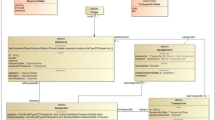Abstract
The extensions for logic-based knowledge bases with integrity constraints are rather popular. We put forward an alternative criteria for analysis of integrity constraints in Web ontology language (OWL) ontology under the closed world assumption. According to this criteria, grounded circumscription is applied to define integrity constraints in OWL ontology and the satisfaction of the integrity constraints by minimizing extensions of the predicates in integrity constraints. According to the semantics of integrity constraints, we provide a modified tableau algorithm which is sound and complete for deciding the consistency of an extended ontology. Finally, the integrity constraint validation is converted into the corresponding consistency of the extended ontology. Comparing our approach with existing integrity constraint validation approaches, we show that the results of our approach are more in accordance with user requirements than other approaches in certain cases.
Similar content being viewed by others
References
Antoniou G, Van Harmelen F. In: Web ontology language: OWL. Springer, 2004, 67–92
Baader F, McGuinness D L, Nardi D. The Description Logic Handbook: Theory, Implementation, and Applications. Cambridge University Press, 2007
Kremen P, Kouba Z. Ontology-driven information system design. IEEE Transactions on Systems, Man, and Cybernetics, Part C: Applications and Reviews, 2012, 42(3): 334–344
Khalid M A, Edgar H S. Translating relational & object-relational database models into OWL models. In: Proceedings of the 2009 IEEE International Conference on Information Reuse & Integration. 2009, 336–341
Kowalski R. Logic for Data Description. Springer, 1978
Eiter T, Lukasiewicz T, Schindlauer R, Tompits H. Combining answer set programming with description logics for the semantic web. Artificial Intelligence, 2008, 172(12): 1495–1539
Motik B, Rosati R. Reconciling description logics and rules. Journal of the ACM, 2010, 57(5): 1–62
Reiter R. On integrity constraints. In: Proceedings of the 2nd Conference on Theoretical Aspects of Reasoning about Knowledge. 1988, 97–111
Levesque H. All I know: a study in autoepistemic logic. Artificial Intelligence, 1990, 42(2): 263–310
Donini F, Lenzerini M, Nardi D, Schaerf A, Nutt W. An epistemic operator for description logics. Artificial Intelligence, 1998, 100(1): 225–274
Donini F, Bari P, Nardi D. Description logics of minimal knowledge and negation as failure. ACM Transactions on Computational Logic (TOCL), 2002, 3(2): 177–225
Tao J, Sirin E, Bao J, McGuinness D. Integrity constraints in OWL. In: Proceedings of the 24th AAAI Conference on Artificial Intelligence. 2010
Motik B, Horroks I, Sattler U I. Bridging the gap between owl and relational databases. Web Semantics: Science, Services and Agents on the World Wide Web, 2009, 7(2): 74–89
Cui X J, Ouyang D T, Ye Y X, Wang H Y. Integrity maintenance of continually changed OWL ontology. Journal of Computational Information Systems, 2012, 8(7): 2931–2939
Ouyang D T, Cui X J, Ye Y X. Mapping integrity constraint ontology to relational databases. The Journal of China Universities of Posts and Telecommunications, 2010, 17(6): 113–121
Cui X J, Ouyang D T, Ye Y X, Wang X L. Translation of Sparql to SQL based on integrity constraint. Journal of Computational Information Systems, 2011, 7(2): 394–402
McCarthy J. Circumscriptionała form of non-monotonic reasoning. Artificial Intelligence, 1980, 13(1): 27–39
Sengupta K, Krisnadhi A, Hitzler P. Local closed world semantics: grounded circumscription for OWL. In: Proceedings of the 10th International Conference on the Semantic Web. 2011(1): 617–632
Horrocks I, Patel-Schneider P F, Harmelen F. From SHIQ and RDF to OWL: the making of a web ontology language. Web Semantics: Science, Services and Agents on the World Wide Web, 2003, 1(1): 7–26
Lifschitz V. Foundations of logic programming. Principles of Knowledge Representation, 1996, 3: 69–127
Author information
Authors and Affiliations
Corresponding author
Additional information
Dantong Ouyang is a PhD supervisor. She is a member of the Subject Appraisement Group of the Degree-Assignment Committee of the National State Department and the member of Theoretical Computer Science Committee of China Computer Federation (CCF), the vice dean of the CCF Artificial Intelligence and Pattern Recognition Committee. Her research interests are in the areas of logic in the semantic web and automated reasoning.
Xianji Cui is currently a PhD student in the College of Computer Science and Technology in Jilin University, China, where she received her BE in Computer Software and Theory in 2011. Her research interests are in the areas of ontology engineering and semantic web technologies.
Yuxin Ye is currently a lecturer with the College of Computer Science and Technology in Jilin University, China. He received his PhD in Computer Software and Theory in 2010. His research interests are in the area of reasoning in the semantic web.
Rights and permissions
About this article
Cite this article
Ouyang, D., Cui, X. & Ye, Y. Integrity constraints in OWL ontologies based on grounded circumscription. Front. Comput. Sci. 7, 812–821 (2013). https://doi.org/10.1007/s11704-013-2284-2
Received:
Accepted:
Published:
Issue Date:
DOI: https://doi.org/10.1007/s11704-013-2284-2




